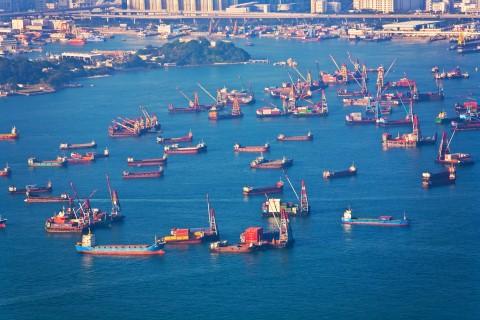
Singapore shipbrokers confirm China slowdown as fuel oil-tankers bank up
Fuel-oil ships moored off Malacca looking for buyers as China oil-rut deepens.
Economies run on fuel, so when fuel demand slows it is a sign that things are not well. With 40 % China’s oil flowing through Singapore, any slowdown in the Chinese economy will show up in Singapore’s ports first. And that is exactly what brokers the Singapore Business Review spoke to have said is happening.
“There is a lot more fuel oil coming and being stored off Singapore, with no increase in enquiries for cross Singapore voyage which is typically Singapore to China and Singapore to Japan,” said one broker who asked not to be named.“My feeling is demand from the China side is dropping say 2-5 % over the last month” he said, adding that the drop to Japan was even larger. The fall in demand for fuel-oil, which is used by electricity generators, can be explained by the fact that Japan is restarting its nuclear reactors. But for China the reason for the drop in demand isn’t as clear.
Another broker said that the situation for fuel oil to China was complicated by new laws imposed limiting the use of bituminous fuel-oil. “There doesn’t seem to be much going to China, it’s very quiet. In the last two weeks we saw very few and last week it was practically dead. It has quietened down compared to three months ago, especially after the China government clamped down on Bituminous Mixture, so that has stopped a lot of traders going into China,” he said. “The ships were getting stuck there and they have to pay a full tax on the fuel oil so that stopped the trade.” The trader added that there were believed to be at least two fuel-oil ships moored off the coast of Malacca laden with fuel-oil but without a buyer.
Another trader said that changes in Chinese regulation were also disrupting the market. ‘Teapot’, or independent small refineries in China, are now getting higher crude import quotas from the government, whereas in the past in the past they had to import fuel oil as a feedstock for their refineries because of crude import restrictions. There has also been a change in tax regulations this year. “Basically Chinese refiners can save on taxes paid if they use bitumen feedstock instead of fuel oil. So we now see record bitumen imports going into China, and this is replacing fuel oil imports.
The government has realised its mistake, and is now trying to reverse this policy. He added that lower prices for crude oil made it more attractive for refiners to produce gasoline for which there has been a high demand, but consequently the other refined products like Fuel oil are being refined at a higher rate than demand and contango has occurred. Contango is when people are willing to pay more for a commodity in the future than they are now. As result, the fuel oil has been piling up. “We saw huge fuel oil storage in June/July this year around Singapore, during the period when refineries run at maximum to cater to peak summer demand. There were around 30 aframaxes storing fuel oil in the Singapore region.”
























 Advertise
Advertise









